- Home
- Roddy Doyle
Paddy Clarke Ha Ha Ha Page 19
Paddy Clarke Ha Ha Ha Read online
Page 19
—Wha’?
She pointed at us. It was too late to run.
—Them, she said.
He saw the sawdust in our hands. He was colossal. He was the biggest, fattest man in Barrytown. He didn’t live in Barrytown, like the other people who lived in the rooms on top of their shops. He came to work on a Honda 50. He made a face like he was annoyed with Missis O’Keefe. She was wasting his time; he’d been doing something.
—Come here, lads, till I show yis somethin’.
It was me, Kevin and Ian McEvoy and Sinbad. Liam and Aidan were at their auntie’s in Raheny again. We went over to him.
—Stay there.
He went into the fridge and came back out with an animal’s leg. It was over his shoulder. He was wearing a white coat. I thought it was a cow’s, the leg.
-Over here.
We followed him behind the counter to the wooden block. It was clean. I could see scrape marks from the brush. I’d seen him with the brush before. It was the same shape as a brush but instead of bristles there was metal. He got the leg from his back to the block with just barely a flick of his hand. It slapped the wood. He let us feel it.
—Now, lads.
His knife was in a scabbard on a hook above the table. He took it out. It made a swish. He let us look properly at it.
—That cost me hundreds of pounds, lads, he said. —Don’t touch it.
We weren’t going to.
—Now look here, he said.
He slid the knife over the meat’s skin—just slid it—and it came away; a chop. He made no effort; he leaned the edge on the leg, that was all. No noise, no tension. He was sweating though. He broke the chop’s bone with a different knife, a cleaver. He thumped it onto the bone, once, twice, and the chop fell flat on the block.
—Now, he said.—That’s all there is to it. And that’s what I’ll do to you feckers the next time I catch yis robbin’ my sawdust.
He still looked nice and friendly.
—Sprinkle it all back on the floor on your way out. Bye bye, lads.
He went back into the fridge. I made sure that all my sawdust was even all over the floor. Sinbad ran away after he’d flung his sawdust out of his pockets.
—He did a jobby, I told them all.—Down his leg.
—IT’S ALL DOWN YOUR LEG -
GICK GICK - LA LA -
—Down as far as his shoes, I said.
—IT’S ALL DOWN YOUR LEG -
GICK GICK - LA LA -
Ian McEvoy’s guinea-pig died because of a cold night. He came out to have a look at it before school and it was in a corner of its box covered in frost. He blamed his ma for not letting him bring it to bed with him.
—She said I’d’ve smothered it, he said.
—I’d prefer to be smothered than die from the cold, said Liam.
—It was sub-zero last night, I told them.
The life expectancy of a guinea-pig was seven years if you changed its water every day and gave it hot bran mash for its dinner every day in the winter. Ian McEvoy only had his one for three days. He didn’t even have a name for it. He asked his ma but she wouldn’t tell him what hot bran mash was; she said she didn’t know.
—Grass will do him, Ian McEvoy said she said.
His da was no help either.
—Buy him an anorak, he said.
He thought he was funny.
We got his sister’s doll and a pin. We brought them down to the field; we smuggled them down. The doll didn’t look enough like Missis McEvoy.
—Doesn’t matter, said Kevin.
—She doesn’t have white hair like that, I said.
—Doesn’t matter, said Kevin,—so long as we’re thinking about her when the pins go in.
We were going to use Action Man for Mister McEvoy but Edward Swanwick wouldn’t let us have his one and he was the only one that had one.
—Doesn’t matter, said Kevin.—He’ll be all in bits when Missis McEvoy dies and that’s enough.
—He doesn’t like her much, said Ian McEvoy.—I don’t think.
—He’ll still miss her, said Kevin.
We beat up Edward Swanwick anyway, but not in the face.
Kevin was the high-priest again but he let Ian McEvoy stick in the pin first because she was his ma and it was his sister’s doll.
—Missis McEvoy!
Kevin held his hands up into the air.
—Missis McEvoy!
We held an arm and a leg each, like the doll was going to get away.
—You must die!
Ian McEvoy put the pin in her tummy, through her dress. I wondered was there a girl somewhere with white hair and big eyes screaming in agony.
—You must die!
I got her in the brain. Kevin got her in the gee. Liam got her in the bum and Aidan got one of her eyes. The pin marks were hardly there; we didn’t do anything else to the doll. Ian McEvoy wouldn’t let us. He brought it home. He went in to see. We waited for him outside. He came out.
—She’s making the dinner.
—Damn.
-Stew.
It was Wednesday.
We weren’t too disappointed but we pretended we were. We squashed the guinea-pig through Kilmartin’s letter box and Missis Kilmartin never found out who’d done it. We wiped our fingerprints off it first.
She listened to him much more than he listened to her. Her answers were much longer than his. She did two-thirds of the talking, easily that much. She wasn’t a bigmouth though, not nearly; she was just more interested than he was even though he was the one that read the paper and watched The News and made us stay quiet when it was on, even when we weren’t making any noise. I knew she was better at talking than him; I’d always known that. He was good sometimes and useless others and sometimes you could tell that you couldn’t go near him to ask him or tell him anything. He didn’t like being distracted; he said that word a lot, but I knew what it meant, Distracted, and I didn’t know how he was being distracted because he wasn’t doing anything anyway. I didn’t mind, only sometimes. Fathers were like that, all the fathers I knew, except Mr O’Connell and I didn’t want a da like him, only maybe for the holidays. Broken biscuits were lovely but you needed vegetables and meat as well even if you didn’t like some of them. All das sat in a corner of a room and didn’t want to be disturbed. They had to rest. They put the food on the table. My da came home on Friday with food, in a big huge canvas bag that he balanced on top of his shoulder. There was a cord at the top of the bag for tying it shut. It was the type of rope that hurt your hands. Tiny little bits of rope got into the skin of your fingers if you grabbed the rope too fast. Ma always emptied the bag. It was full of vegetables. He bought them all in Moore Street. My da paid for all the other food we got as well, everything. He had to get his energy back at the weekend. Sometimes I didn’t believe that that was the only reason for not being able to go near him, for the way he got into his corner and wouldn’t come out. Sometimes he was just being mean.
I won a medal. I came second in the hundred yards except it wasn’t nearly a hundred yards; it wasn’t even fifty. It was a Saturday, the school sports, the first one the school ever had. There were twenty in the race, right across the field. Henno was in charge of the start. He had a whistle. He had a flag as well but he didn’t use it. The field was real uneven. It was hard to go straight, and the grass was longer in some places. I saw Fluke Cassidy falling. He’d been a bit ahead of me but I was catching up on him. I saw his leg going crooked. I went past. I heard the air rushing out of him. I threw my hands up at the finish, the way they did it. I thought I’d won; there was no tape and there was no one near me when I ran over the line. But Richard Shiels had won, over at the end of the field. I came second, out of twenty—better than eighteen. Henno had something to say.
—Well done, Mister Clarke. If only you were as quick with your answers in class.
I was quick in class; I knew more about some things than Henno did. Henno was a bastard. A bastard was someone whose p
arents weren’t married, or a child of illegitimate birth. Henno wasn’t a child any more but he was still a bastard. He couldn’t just give me my medal, he had to make a laugh out of it. Illegitimate wasn’t in my dictionary but Legitimate meant In accordance with the laws or rules so Illegitimate meant the complete opposite of that. Hirsute meant hairy.
—His mickey is very hirsute.
—Hirsute!
—Hirsute hirsute hirsute!
The medal had a runner on it, no name or writing. The runner had on a white vest and red shorts and no runners. His skin was the same colour as the medal. I walked home; I didn’t want to run. I went to my da first.
—Get out; not now.
He didn’t look up. He was reading the paper. He always talked about Backbencher on Saturdays, telling my ma what Backbencher’d said, so he might have been reading Backbencher. He clicked the paper, straightened it up. He wasn’t angry or anything.
I felt thick. I should have gone to my ma first; it would have been easier then, what had happened. I went to the door; the bones in my legs were rubbery. He was in the drawing room. Peace and quiet, that was what he got in there, the only place in the house. I didn’t mind waiting, not really, but he hadn’t even looked up. I was going to shut the door quietly.
He looked.
—Patrick?
—Sorry.
—No; come in.
The paper fell forward, folded over; he let it.
I let go of the handle. It needed oiling. I came back in. I was scared and pleased, bits of each. I wanted to go to the toilet; I thought I did, that kind of feeling. I asked him something.
—Are you reading Backbencher?
He smiled.
—What have you got there?
—A medal.
—Show us; you should have told me. You won.
—Second.
—Nearly first.
—Yeah.
—Good man.
—I thought I won.
—Next time. Second’s good though. Put it there.
He held out his hand.
I wished he’d done it the first time. It wasn’t fair the way he made you nearly cry before he changed and did what you wanted him to. It didn’t always happen that way but it happened enough for him to have parts of the rooms to himself, for the house to be different at the weekends. I could never run to him; I had to check first. I blamed the paper. Newspapers were stupid, with their World War Three Looms Near when all that was happening was the Israelis milling the Arabs. I hated that. If someone said they’d kill you then they should have done it.
—I’ll hurt you.
That were better.
Papers were boring. Da sometimes read out to my ma what Backbencher said and it was stupid. Ma listened but only because my da was reading it and he was her husband.
—Very good.
That was what she usually said but it never sounded like she meant it; she said it the same way she said Go to sleep.
—The word was made flesh!
Swish.
—Backbencher!
They were big and the writing was tiny and they took all day to read, especially on Saturday and Sunday. I read a thing about a high-cross that was damaged by vandals. It was on the front page of the Evening Press, and it took me eight minutes. There was a picture of a high-cross but there wasn’t any damage on it. I could always tell, when I was going down to the shops to get the paper, if it was a real nice day in the summer, sunny all day, there’d be a picture of girls or children at the beach on the front, usually three of them in a row; the children always had a bucket and spade in front of them. That was what happened my da: he started to read the paper and then he had to finish it—he thought he was being good doing it - and it took him all day. He became grouchy and dangerous; he was running out of time. The writing was small so he couldn’t be distracted. Saturday afternoon: Ma was nervous, we hated him and all he’d done was read Backbencher.
I’ll crucify you.
James O‘Keefe’s ma always said that to James O’Keefe and his brothers and sister. All she meant was Do what you’re told. I’ll leather you. I’ll skin you alive. I’ll break every bone in your body. I’ll tear you limb from limb. I’ll maim you.
They were all stupid.
I’ll swing for you. I didn’t know what that one meant. Missis Kilmartin roared it at Eric her mentler son. He’d opened up all the bags in six boxes of crisps.
My ma explained.
—It means that she’ll murder him and then she’ll be condemned to hang for it but she doesn’t really mean it.
—Why doesn’t she say what she does mean?
—It’s just the way people talk.
It must have been great being mental. You could do anything you wanted and you never really got into proper trouble for it. You couldn’t pretend you were mental though; you had to be that way all the time. No homework either and you could slobber your dinner as much as you wanted.
Agnes, the woman that worked in Missis Kilmartin’s shop because Missis Kilmartin was busying spying behind the door, she spent ages every day with a scissors cutting bits off the front pages of the newspapers, the bit with the name of the paper and the date under it, only that.
—Why?
—To send them back.
—Why? I asked.
—Because they don’t want the whole paper.
—Why not?
—They just don’t. They don’t need them. They’re out of date, useless.
—Can I have them?
—You can not.
I didn’t want them. I just said it because I knew she was going to say that and I was checking.
—Missis Kilmartin wipes her bum with them, I said.
Not loud.
Sinbad was there. He stared at the window door: she was behind it. Agnes spoke back quietly.
—Get out now, yeh pup, or I’ll tell her.
She lived in the same house as her ma; she wasn’t really a woman at all. They lived in a cottage that was stuck in the middle of the new houses. The grass in their garden was always perfect.
Da’s face was different when he was reading the paper. It was pushed forward, his eyebrows were pushed up. Sometimes his lips were open but his teeth were closed. I heard him grinding his teeth and I didn’t know what it was. I looked all around the room. I stood up. I’d been sitting on the floor beside him waiting for him to finish. I couldn’t see anything. I looked at my ma. She was reading Woman; not really reading, turning the pages, still looking at the page when she was turning, her hand going with it, the exact same amount of time for each page. I looked at my da, to see if he was hearing what I was, strong things going to break, and I saw his mouth moving - I watched: it moved at the same time as the noise; it was the noise. I waited for the snap. I wanted to warn him. I hated him for doing it. Newspapers were bastards.
—I was thinking of getting pork for a change.
He said nothing; he didn’t look.
—It might be nice.
His face was stuck to the page. His eyes weren’t moving down. He wasn’t reading. He made her say it.
—What do you think?
He cracked the paper. He folded it. He concentrated hard on it. He spoke but it was hardly like he was speaking; it was like the words came out with a sigh - not even a whisper.
—Do what you want.
Face on the paper, legs crossed and stiff, no rhythm.
—Whatever you want.
I didn’t look back at my ma yet; not yet.
—You always do.
I still didn’t look.
She didn’t say anything.
I listened.
He was the only one I could hear breathing. He was pushing the air out, of his nose. Oxygen in, carbon dioxide out. Plants did it the other way round. I heard hers now, her breathing.
—Can I turn on the telly? I said.
I wanted to remind him that I was there. There was a fight coming and I could stop it by being there.
There was nothing wrong. She’d never have said that if there had been. Ma hated half-words and bits of words and words that weren’t real ones. Only full, proper words.
—Television, I said.
She didn’t mind Don’t and Amn’t and shortened words like that. They were different.—It’s a television, she’d say, not really giving out.—It’s a wellington. It’s a toilet.
Her voice was normal.
—Television, I said.—Can I?
—What’s on? she asked.
I didn’t know. It didn’t matter. The sound would fill the room. He’d look up.
—Something, I said.—There might be, maybe a programme about politics. Something of interest.
—Like what?
—Fianna Fail versus Fine Gael, I said.
That made Da look at me.
—What’s on? he said.
—There might be, I said.—Not for definite.
—A match between them?
—No, I said.—Talking.
The only programmes he didn’t pretend he wasn’t watching were ones with people talking in them, and The Virginian.
—You want the television on? he said.
—Yeah.
—Why didn’t you say just that?
—I did say it, I said.
—Fire away, he said.
His leg was moving, the one on top of the one on the ground, up and down. He sometimes put Catherine and Deirdre on his foot and carried them up and down. He did it to Sinbad as well once - I could remember it - so he must have done it to me as well. I got up.
—Is your homework done?
-Yes.
—All of it?
-Yes.
—The learning?
-Yes.
—What did you get?
—Ten spellings.
—Ten of them; give us one?
—Sediment. Do you want me to do it?
—There’s no point, but yeah.
-S.e.d.i.m.e.n.t.
—Sediment.
—C.e.n.t.e.n.a.r.y.
—Centenary.
—Yeah. That’s the name for a hundredth anniversary.
—Like your mother’s birthday.

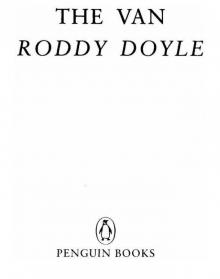 The Van
The Van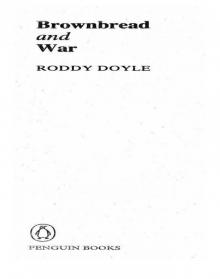 Brownbread & War
Brownbread & War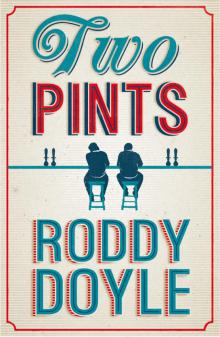 Two Pints: A Collection
Two Pints: A Collection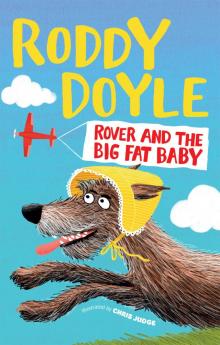 Rover and the Big Fat Baby (Giggler 4)
Rover and the Big Fat Baby (Giggler 4)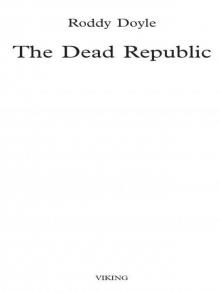 The Dead Republic
The Dead Republic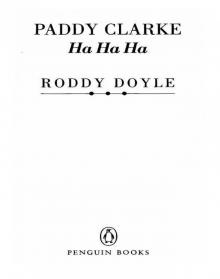 Paddy Clarke Ha Ha Ha
Paddy Clarke Ha Ha Ha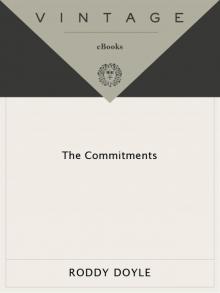 The Commitments
The Commitments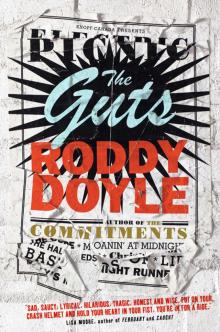 The Guts
The Guts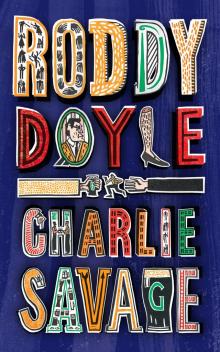 Charlie Savage
Charlie Savage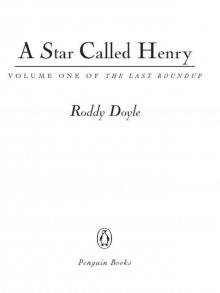 A Star Called Henry
A Star Called Henry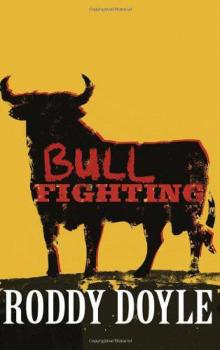 Bullfighting: Stories
Bullfighting: Stories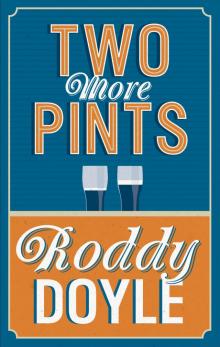 Two More Pints
Two More Pints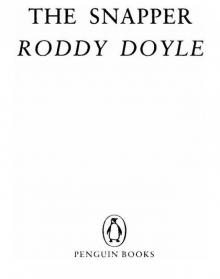 The Snapper
The Snapper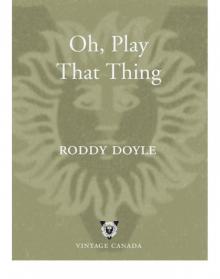 Oh, Play That Thing
Oh, Play That Thing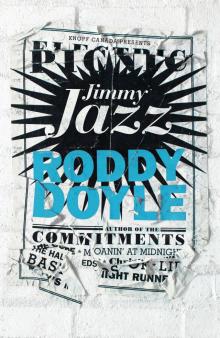 Jimmy Jazz
Jimmy Jazz Paula Spencer
Paula Spencer Wilderness
Wilderness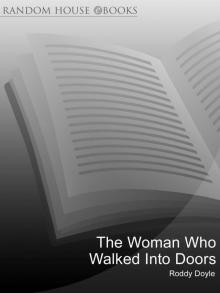 The Woman Who Walked Into Doors
The Woman Who Walked Into Doors The Deportees
The Deportees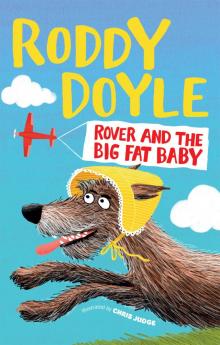 Rover and the Big Fat Baby
Rover and the Big Fat Baby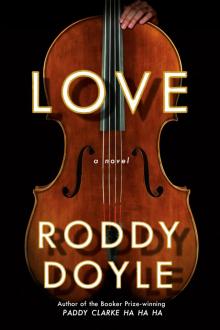 Love
Love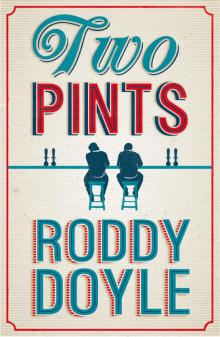 Two Pints
Two Pints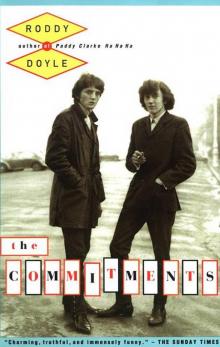 The Commitments b-1
The Commitments b-1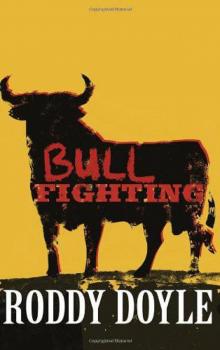 Bullfighting
Bullfighting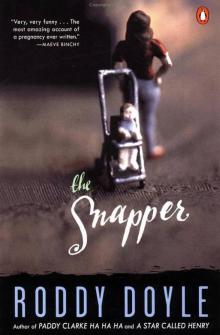 The Snapper b-2
The Snapper b-2